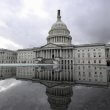The Food and Drug Administration (FDA) has been ordered by a federal judge in Texas to greatly accelerate the process of making public the vaccine trial data that it relied on to license Covid-19 vaccines.
U.S. District Judge Mark Pittman opened his order with the phrase, "Democracy dies behind closed doors," an apparent reference to the Washington Post slogan, "Democracy Dies in Darkness."
He wants all related documents to both Moderna's vaccine for adults and Pfizer's vaccine for children to be made public by mid-2025 — a little over two years from now — as opposed to the FDA's plan of taking 23.5 years to release it all. That is about 10 times faster than the FDA intended to produce the documents, according to The Epoch Times.
The ruling was made in a case in which the plaintiffs, the parents of a child injured by a Covid-19 vaccine, filed a lawsuit against the FDA.
The FDA had argued it would be "impractical" to release the documents at a pace faster than their estimate of 1,000 to 16,000 pages per month, of the estimated 4.8 million pages, which would have taken at least 23.5 years.
The lawyers representing the plaintiffs, Siri and Glimstad, called the decision "another blow for transparency and accountability," which builds on a January 2022 court order, also by Judge Pittman, targeting Pfizer's Covid-19 vaccine data for those aged 16 and older. In that order, Pittman required Pfizer to produce the documents at a rate of 55,000 pages per month, which was much faster than the 75 years that Pfizer was seeking.
"That production should be completed in a few more months," Aaron Siri of the plaintiff's law firm said in a statement, referring to the Pfizer data.
Judge Pittman's latest order requires the FDA to produce all of its data on Pfizer's vaccine for 12- to 15-year-olds and Moderna's vaccine for adults by June 30, 2025.
While the judge acknowledged that the court is aware of the FDA's limited resources dedicated to freedom of information requests (FOIA), he stated that "the number of resources an agency dedicates to such requests does not dictate the bounds of an individual's FOIA rights."
"Instead, the Court must ensure that the fullest possible disclosure of the information sought is timely provided — as 'stale information is of little value,'" Pittman wrote.
Related Story: NIH Records Show Feds Funded Research in China to Create Coronavirus ‘Mutants’










